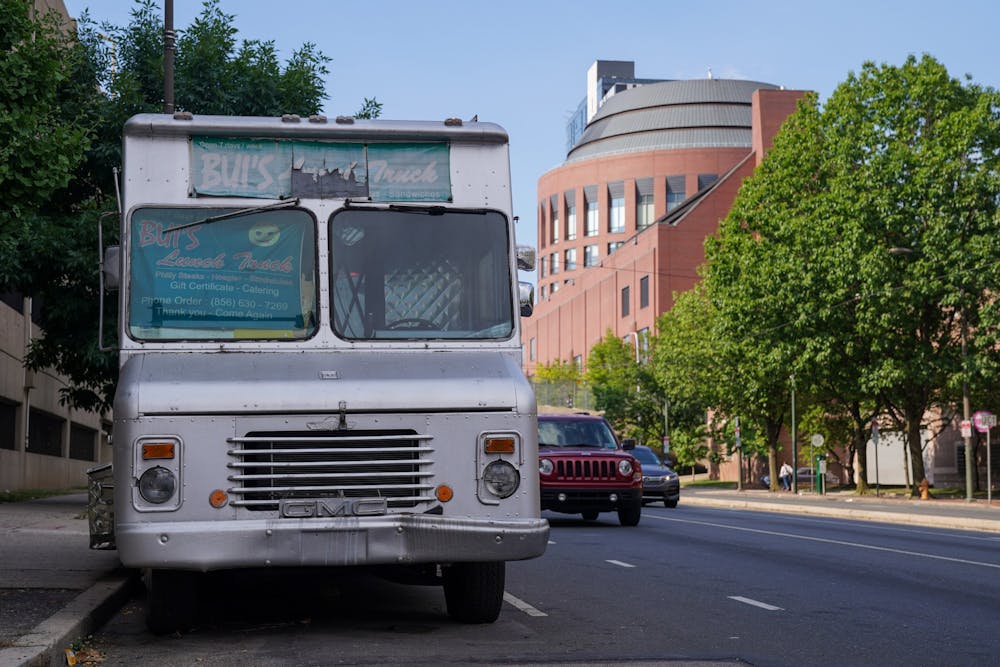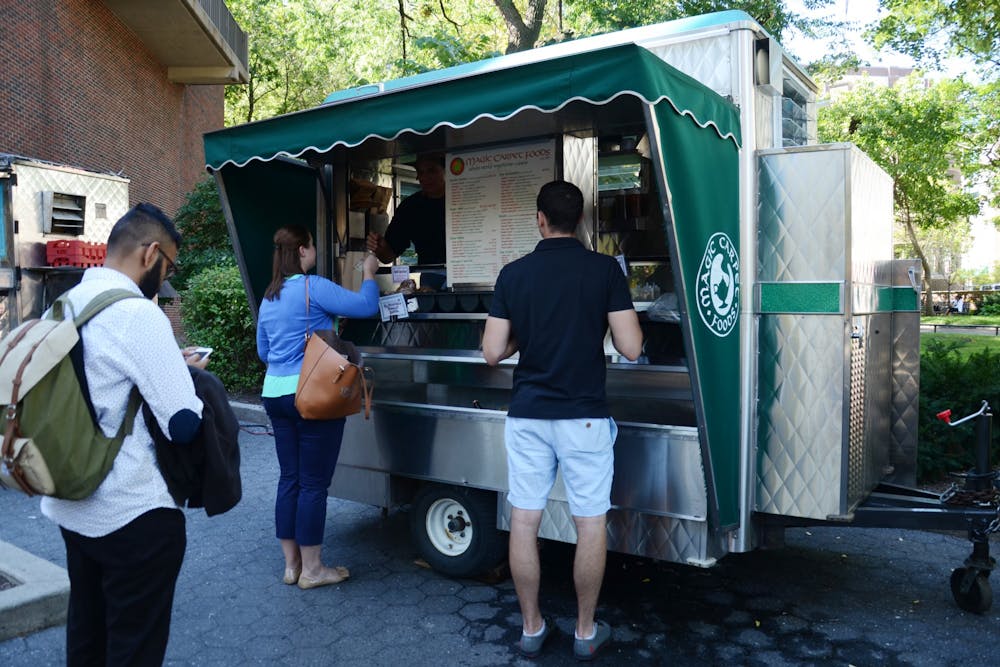
Bui's Lunch Truck will remain closed until the fall.
Credit: Chase SuttonIn January, Jihed Chehimi, the owner of Chez Yasmine, the French-Tunisian fusion food truck at Spruce and 37th streets, donned a mask and began preparing for COVID-19 to reach the United States. Around him, long, tightly-packed lines for other food trucks filled the streets. There were no masks, no gloves, and no designated physical distance between customers.
Chehimi, a former research scientist who earned his Ph.D. in Immunology and Infectious Diseases in Paris, said he knew a pandemic was looming. He therefore began wearing facial coverings at all times, requiring his employee to wear gloves, and disinfecting his truck’s kitchen once every hour of operation.
Despite Chehimi’s precautions, his business has not been immune to the hardships the pandemic has brought onto many small business owners, particularly Phildelphia's mobile food vendors. In comparison to the government-endowed support that brick-and-mortar businesses have received, food truck owners have been given little to no aid from local government.
In mid-March, Philadelphia became the only jurisdiction in Pennsylvania to bar food truck operations during the COVID-19 outbreak. Although the city allowed mobile vendors to reopen after two months on May 26, many food trucks decided to remain closed for the summer due to the lack of customers on the streets as many students and local employees continue to work from home.
While street vendors were initially banned from operation, Philadelphia restaurants were allowed to provide solely takeout and delivery services. Many local restaurateurs received monetary aid through programs such as the Philadelphia COVID-19 Small Business Relief Fund and the Paycheck Protection Program, which provide loans and grants to small business impacted by the pandemic.
While these efforts helped to protect traditional restaurants from the financial consequences of COVID-19, they left food truck owners with little support.
In University City, it has been particularly challenging for mobile food vendors as they watched their customer base vanish almost overnight when Penn students were told not to return to campus in mid-March.
Chez Yasmine, Magic Carpet, and Bui’s, which are located on Penn's campus, will remain closed until students return to campus for the fall semester, while others, such as Tacos Don Memo, have reopened to serve an almost-empty city.
“As a city, we have taken a more punitive stance toward food trucks in a way that doesn’t really honor their place as relevant small businesses, particularly for Black entrepreneurs and other entrepreneurs of color and for many immigrant entrepreneurs as well,” District Three Councilmember and 2004 Stuart Weitzman School of Design graduate Jamie Gauthier said.
Chehimi said he applied for a grant from the University City District Small Business Emergency Grant Fund, which provides local small businesses with grants up to $5,000, and did not receive any money. He said his $1200 stimulus relief check from the federal government is holding him over for now, and that Chez Yasmine will remain closed until September when students return to campus. On June 25, Penn announced it will bring students back to campus for classes beginning on Sept. 1 with a hybrid model of in-person and remote instruction until Thanksgiving break in late November.

For local food trucks that have decided to reopen, their owners said it has been difficult to generate income from empty streets as most people continue to work from home.
Tacos Don Memo, a food truck located on 270 South 38th street serving tacos and burritos, has lost almost 70% of business compared to pre-pandemic revenues.
Although the truck reopened on June 15, Tacos Don Memo owner Leo Saavedra said that if the truck does not start receiving more customers soon, he may have to close his business for the rest of the summer until students return to University City and more people return to their workplace.
Saavedra said that his three most lucrative months of the year are usually March, April, and May — all of which were lost due to the city’s temporary shutdown of street vendors. He applied for a Paycheck Protection Program loan last month and has yet to hear back, he said. Paycheck Protection Program loans, which are only given to small businesses, can be grants of up to $10 million.
Although the overhead expenses for food trucks are considerably lower than those for restaurants, these trucks are often small, family-owned businesses.
If sales are impacted or their truck cannot operate, family owners can lose their entire source of income.
Deb Varvoutis and Dean Varvoutis, the couple who owns the vegan food truck Magic Carpet, with locations at 36th and Spruce streets and 34th and Walnut streets, said they waited six “scary” weeks without income. Magic Carpet Foods has been serving the Penn community for nearly 36 years.
Deb Varvoutis said they would not have been able to pay any bills without external financial assistance. In April, the owners became eligible for unemployment benefits as a result of the Pandemic Unemployment Assistance program, which provides up to 39 weeks of unemployment benefits to qualifying individuals unable to work due to COVID-19 related reasons, as outlined in the CARES Act.
“That was wonderful, that meant we were going to survive,” Dean Varvoutis said.
Bui’s, located at 38th and Spruce streets near the 38th Street bridge, is a family-owned operation that has served the University City community for more than 30 years. Like Deb and Dean Varvoutis, Bui’s second-generation owner Rachel Pran is currently living on unemployment benefits.
Pran, the truck's only employee, said she cannot risk opening the truck yet because the business cannot operate if she gets infected with the virus.
Like Bui’s, Magic Carpet will also stay closed for the summer, although they waited a week longer than most mobile vendors before officially shutting down their business in late March — after a failed attempt to immediately pivot to a delivery-only business model earlier that month.
“University City became a ghost town overnight, and we couldn’t put our employees and ourselves at risk any longer with the virus spreading so quickly,” Deb Varvoutis said.
Magic Carpet is different from most other campus food trucks as it operates through a commercial kitchen in South Philadelphia with five to seven employees, in which the food is prepared and then brought to the two on-campus trucks to sell. One Magic Carpet truck is located outside the Quad, and the other is located near Fisher Bennett Hall.
Since food delivery practices were allowed to continue despite the ban of food trucks, Magic Carpet owners partnered with Grubhub, a mobile food delivery service app, to deliver orders directly from the South Philadelphia kitchen. The couple said they struggled with social media advertising to spread awareness about the truck's new business model.
“Trying to play catchup when you’re over 60 and you’re talking about learning a new digital language so you can communicate with people and express what your real needs are, it's difficult honestly,” Dean Varvoutis said.
After three days of offering delivery service in March, Magic Carpet received just one order from a close friend. The truck typically served between 100 and 200 customers daily before the pandemic, Dean Varvoutis said.
Although the couple did not get a Paycheck Protection Program loan the first time they applied, Magic Carpet was awarded a loan in the program's second round of financing. The co-owners plan to use the aid to help reopen the truck in August.
The couple said they will pioneer Magic Carpet's first online ordering and delivery service in the fall, and said they recently purchased electric tricycles to deliver orders within a half-mile radius of campus.
Bui’s also hopes to open in August once students return to campus, Pran said. She closed the truck in early March, when she heard Penn students would not be returning from spring break.
“When my customers go home, I go home too,” Pran said.
As a result of tight-knight relationships with students, food trucks are a pillar of Penn students’ daily lives. Rising College junior Brahm Wieseneck is one of many with a strong affinity for Lyn’s, a truck located at 36th and Spruce streets that is known for its breakfast sandwiches and for Lyn, the truck owner, herself, who has a knack for memorizing students’ preferred orders even after graduation.
When Pennsylvania's statewide stay-at-home order went into place in March, Wieseneck initiated a GoFundMe campaign to support Lyn. Although he said he never expected the fundraiser to go beyond his group of friends, the page was shared over 100 times on Facebook and received $3,348 in donations in less than one month.
Wieseneck said Lyn was overwhelmed and very grateful for the donations, but said she insisted that he take down the page when the donations reached $3000 because she said there were greater causes in need of funding.
“I think food trucks create a greater sense of community. Many of them have devoted followings," Gauthier said. “For some reason, we don’t recognize this business as a viable business and therefore we don’t create a flexible and support environment.”
The Daily Pennsylvanian is an independent, student-run newspaper. Please consider making a donation to support the coverage that shapes the University. Your generosity ensures a future of strong journalism at Penn.
Donate




